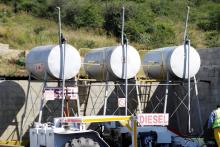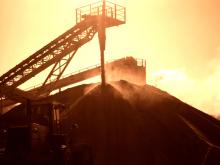In recent years, several South African quarries have been audited for their diesel rebate systems and their refund claims have been disallowed mainly because their record-keeping has been found wanting. To maximise claim eligibility, quarry managers need to improve their level of compliant logging and adherence to the relevant legislation. By Munesu Shoko.
South African Revenue Services’ (SARS) audits of company diesel rebate claims have exposed a costly trend. According to Andrew Hancock, consultant at CustomEx, a firm that specialises in helping industry address diesel rebate claims, most businesses are losing out on potential cash backs because of non-compliant records, and for mines and quarries in particular, this can rocket into millions of rands.
The diesel rebate was designed to protect South African industries against international competition and to provide relief to consumers who do not necessarily use roads. However, Hancock says several operations are missing out on potential gains because many of them are put off by the perceived administrative burden of the logging requirements. In his dealings with several quarries, he has noted that most information relevant to the diesel rebate system is recorded, but not compiled into the required format.
“Most have a form of record keeping but it does not conform to the specific requirements. Claims are often made on the purchase totals rather than the usage record. When SARS make contact to set up an audit people usually become concerned and that’s when they only reach out for assistance,” says Hancock.
“For those that do not get the necessary help, the audit usually results in massive reversals. As a rule, a two-year period is covered in the audit. When deficiencies are revealed the entire period is reversed and the full amount becomes payable. For smaller operators this can equate to around ZAR200,000 (US$13,330). For some bigger operations, it can run into several millions of rands,” adds Hancock.
He adds that typically the response to this scenario by operations is to stop claiming. The assessment goes unchallenged and future claim benefits are voluntarily lost. “I have found that challenging the audit findings can result in the recovery of some or all of the intended reversal,” he says.
So, what does the related legislation say? Legislation allows certain industry sectors to recover Fuel Levy and Road Accident Levy from diesel purchases in accordance with certain legislated parameters. These activities are identified largely based on the fact that vehicles utilised are not essentially road users. The industries selected are also major economic contributors.
“The legislation defines activities that are eligible for rebate claim and those activities that are non-eligible. The law then allows 80% of that eligible usage to be rebated at the respective rate per litre. The rate per litre is updated every year in early April. From April 3 2019 the applicable rate of rebate is ZAR3.327 (about £0.16) per eligible litre,” explains Hancock.
The legislation also specifies the industries and the activities that apply in order to make a compliant claim. The emphasis is on the activity description and usage for that. Eligible “users” are specified as follows: Onland (Mining/Quarrying); Forestry; Farming; Commercial Fishing; Coastwise shipping; Offshore Mining; National Sea Rescue Institute; Rail freight; and Electricity Generation (Plants Specified).
To qualify for the diesel rebate, an operation must be registered for value added tax (VAT) and for the diesel rebate in terms of the Customs and Excise Act. To qualify for the rebate and to be able to claim it back, the operation must be able to prove and calculate the amount of lawful consumption in terms of Schedule 6 to the Customs and Excise Act. The schedule lists the activities that qualify for the rebate, as well as how diesel usage must be recorded. The rebate is regarded as a ‘provisional concession’ until the quarry can prove reasonably that the diesel was used lawfully.
“Frequency of your claim ties in with the submission of your VAT return for your business. As a defined user, you would need to be registered for VAT purposes with sub registration for diesel rebate purposes,” explains Hancock.
The significance of compliance to maximise the potential for successful diesel rebate claims is enormous. Hancock is of the view that, with the right guidance, compliance is easier than many expect. “Addressing these issues prior to a diesel audit allows operations enough time to align their record keeping and streamline it into their normal workflow. This allows them to enjoy the benefit without financial hurt,” he says.
Speaking on the significance of successful diesel rebate claims, Hancock says the volumes of diesel used within the quarrying and mining context are usually large. The cash back factor (on every VAT return) is significant.
“For example, if a quarry uses 100,000 litres in defined eligible activities, per month, and 80% being 80,000 litres, with the current rate of ZAR3.327 applied, the rebate for one month would equate to ZAR266,160 (about £14,620). For a two-month VAT period you would expect a ZAR532,320 (about £29,240) refund. Compliant claiming also enhances the enterprise’s reputation and integrity with the taxman, especially when tax clearances are required,” concludes Hancock.








